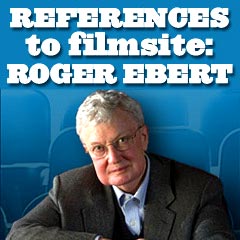
|
References to by Roger Ebert |
About Greatest Films (Filmsite) and Its Reviews (1998-1999)  The 1975 Pulitzer Prize-winning film critic
for the Chicago Sun Times, Roger Ebert, is best known
for his partnership with late critic-colleague Gene Siskel
on their long-running 1986-1999 TV show "Siskel & Ebert" (afterwards
known as "Roger Ebert at the Movies," and now known
as "Ebert & Roeper"
with co-host Richard Roeper). They were formerly hosts of PBS's "Sneak
Previews" and the syndicated "At the Movies"(1982-1986).
The 1975 Pulitzer Prize-winning film critic
for the Chicago Sun Times, Roger Ebert, is best known
for his partnership with late critic-colleague Gene Siskel
on their long-running 1986-1999 TV show "Siskel & Ebert" (afterwards
known as "Roger Ebert at the Movies," and now known
as "Ebert & Roeper"
with co-host Richard Roeper). They were formerly hosts of PBS's "Sneak
Previews" and the syndicated "At the Movies"(1982-1986).
|
|
YAHOO! INTERNET LIFE MAGAZINE JANUARY, 1998  Roger Ebert's Article: "Top 20 Movie Sites 1997" |
"The Greatest Films of All Time represents an astonishing amount of thought and work by Tim Dirks, who is so modest he doesn't even byline his detailed, evocative essays on great films. The site offers many ways of looking at important films, but the centerpiece is his series of 100 long reviews of classics, including downloadable still photos, highly extensive plot summaries, and a lot of quotes (he must have watched the movies with a tape recorder at his side). This site is useful for film students or others seeking an entry point into film history. He has essays on genres, periods and types of movies, and suggested titles in each area, and his sheer love for the movies comes across in his accuracy and energy. His essay on John Ford's My Darling Clementine, for example, clocks in at 6,500 words and includes a postscript on differences between the real gunfight at the OK Corral and the movie version." |
YAHOO! INTERNET LIFE MAGAZINE  Roger Ebert's Article: "Rule of Thumb" in a section titled 'The Greatest Greatest Site' |
 GREATEST GREATEST SITE:
GREATEST GREATEST SITE:"Tim Dirks's 100 Greatest Films site represents a labor of love. He has viewed his choice of the 100 greatest American films and synopsized them in great detail, including big chunks of dialogue (this is a good place to check an exact quote). Each long essay is adorned by posters from the movies. And Dirks doesn't let his ego get in the way. These aren't reviews or opinions but descriptions. His taste is very mainstream - but, hey, it's his site." (www.filmsite.org/momentsindx.html) |
(1997-2007) "The great erotic moment in Vertigo is the one where the man kisses the woman of his fantasy, while the room whirls around him. There is a parallel scene in Notorious, and it was famous at the time as 'the longest kiss in the history of the movies.' It was not, however, a single kiss, as Tim Dirks points out in his essay on the film (www.filmsite.org/noto.html). The production code forbade a kiss lasting longer than three seconds, and so Bergman and Grant alternate kissing with dialogue and eyeplay, while never leaving one another's arms. The sequence begins on a balcony overlooking Rio, encompasses a telephone call and a discussion of the dinner menu, and ends with a parting at the apartment door, taking three minutes in all. The three-second rule led to a better scene; an actual 180-second kiss might look " (August 17, 1997)
Patton (1970):
Unforgiven (1992): The Thin Man (1934):
Alien (1979): The Shining (1980):
|
|
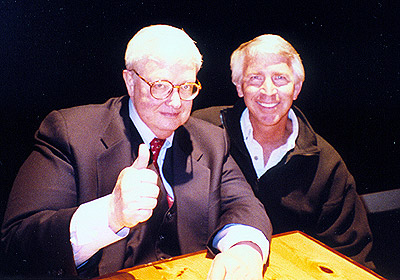 Thumbs Up: April 18, 2002, in San Francisco, l. to r.: Roger Ebert, Tim Dirks |
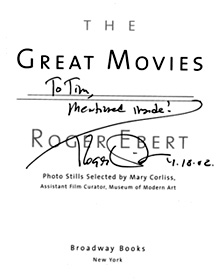 The Great Movies Autographed by Roger Ebert |
Film critic Roger Ebert has penned several books on cinema, including popular video guides and four editions of his writings: The Great Movies,The Great Movies II, The Great Movies III, and The Great Movies IV (see below), based upon his Chicago Sun-Times website articles and other reviews on The Great Movies. See Ebert's Website "The Great Movies." |
 The
Great Movies, by Roger Ebert, 2002 The
Great Movies, by Roger Ebert, 2002A compilation of 100 mini-essays on "The Great Movies," originally posted (since 1997) on Pulitzer winner Ebert's website. Includes "Citizen Kane," "The Third Man," "Casablanca," "Schindler's List," "The General," "Metropolis," "The Godfather," and many more, with 100 carefully selected illustrations. |
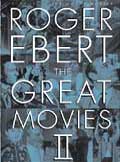 The
Great Movies II, by Roger Ebert, 2005 The
Great Movies II, by Roger Ebert, 2005Ebert's second collection of 100 essays on great movies, including "12 Angry Men," "West Side Story," "The Grapes of Wrath," "King Kong," "Annie Hall," "Mean Streets," "The Birth of a Nation," "Sunrise," and many more. Again with 100 selected b&w illustrations. |
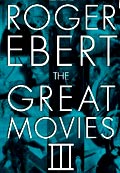 The
Great Movies III, by Roger Ebert, 2010 The
Great Movies III, by Roger Ebert, 2010A compilation of 100 mini-essays on "The Great Movies," originally posted (since 1997) on Pulitzer winner Ebert's website. Includes "Top Hat," "The Band Wagon," "The Godfather, Part II," "The Last Picture Show," "Groundhog Day," "Phantom of the Opera," "Last Tango in Paris," "Safety Last," and many more. |
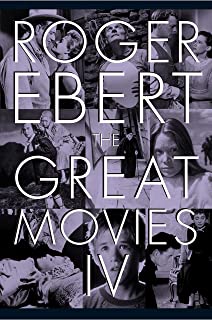 The
Great Movies IV, by Roger Ebert, 2016 The
Great Movies IV, by Roger Ebert, 2016A compilation of 62 brief mini-essays on "The Great Movies," on Pulitzer winner Ebert's website. Includes "The Cabinet of Caligari," "Viridiana," "Superman," "Pink Floyd: The Wall," "The Big Lebowski", "Seven" and "Eternal Sunshine of the Spotless Mind," and many more. |
(2000-2007) Answer Man Column: (May
7, 2000) Answer Man Column: (September
10, 2000) Answer Man Column: (November
5, 2000) Answer Man Column: (December
17, 2000) Answer Man Column: (March
25, 2001) Answer Man Column: (June
16, 2002) Answer Man Column: (January
9, 2005) Answer Man Column: (August
16, 2007) |